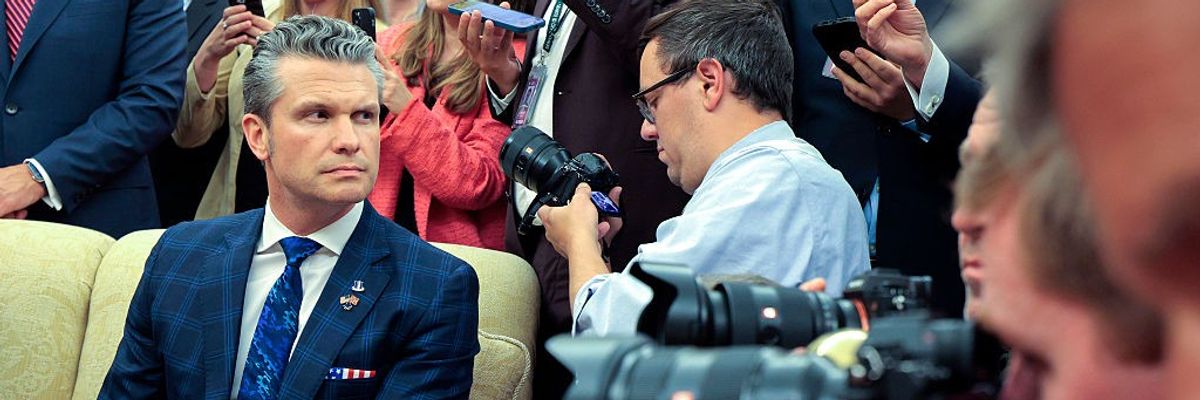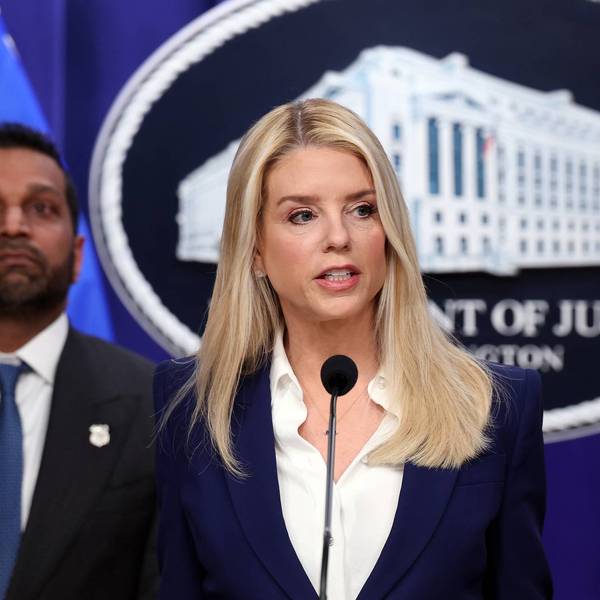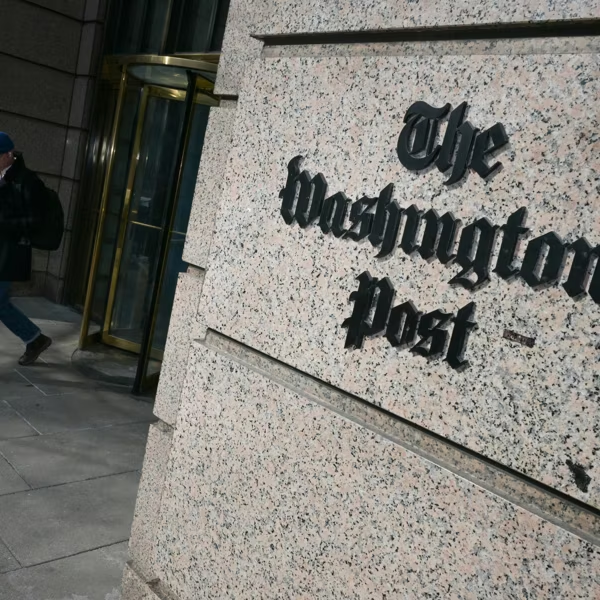
U.S. Secretary of Defense Pete Hegseth attends an Oval Office meeting on April 24, 2025 in Washington, D.C.
'Direct Attack on Freedom of the Press': Hegseth Cracks Down on Journalists Covering Pentagon
One journalist said he is "angry and frustrated—but not surprised—that MAGA propaganda-loving conspiracy theorists like SecDef Hegseth and his team have dropped this JDAM-sized attack on the press."
U.S. Defense Secretary Pete Hegseth, who has pledged to do his part in making the Trump administration the most transparent in history, issued a memo Friday imposing tight restrictions on reporters' movements at the Pentagon in an apparent bid to crack down on leaks.
Under the new policy, which takes effect immediately, journalists are prohibited from entering many locations across the Pentagon building unless they're accompanied by Trump administration personnel—restrictions that Hegseth claims are necessary to protect national security.
"If press require access to other areas/offices within the Pentagon for 'in-person' interviews (or other engagements), they are required to be formally escorted to and from those respective offices by authorized DoD personnel from those specific offices/Agencies/Military Departments," Hegseth's two-page memo states.
Reporters covering the Pentagon will also be "required to complete an updated in-briefing form explaining their responsibilities to protect" classified and "sensitive" information.
"Failure by any member of the resident or visiting press to comply with these control measures will result in further restrictions and possibly revocation of press credentials," reads the memo.
"The Pentagon is making it harder for journalists to do their jobs and easier for power to go unchecked."
The restrictions come in the wake of several scandals that have personally implicated Hegseth, including the revelation that he used a private group chat that included members of his family and his personal attorney to discuss plans for a U.S. attack on Yemen. They also come amid a broader Trump administration assault on press freedom.
The Pentagon Press Association (PPA), which represents journalists covering the U.S. military, said in a statement that Hegseth's memo "appears to be a direct attack on the freedom of the press and America's right to know what the military is doing."
Kevin Baron, a founding officer of the PPA, said he is "angry and frustrated—but not surprised—that MAGA propaganda-loving conspiracy theorists like SecDef Hegseth and his team have dropped this JDAM-sized attack on the press."
"It's un-American," Baron added. "It's dangerous."
National Press Club president Mike Balsamo echoed the PPA's criticism of the new policy, which he said represents a "stark departure from longstanding norms that balanced operational security with meaningful press access."
"By blocking access to common areas, restricting movement without escorts, and complicating basic reporting functions," said Balsamo, "the Pentagon is making it harder for journalists to do their jobs and easier for power to go unchecked."
Hegseth announced the press policy changes as the U.S. military is poised to receive a $1 trillion budget for the coming fiscal year despite mountains of evidence of waste, fraud, and abuse of taxpayer dollars to line the pockets of military contractors. Late last year, the Pentagon failed its seventh consecutive audit.
The American military is involved in conflicts around the world, and the Trump administration—with Hegseth's vocal support—has eased restrictions on U.S. airstrikes and raids outside of "conventional war zones."
An Urgent Message From Our Co-Founder
Dear Common Dreams reader, The U.S. is on a fast track to authoritarianism like nothing I've ever seen. Meanwhile, corporate news outlets are utterly capitulating to Trump, twisting their coverage to avoid drawing his ire while lining up to stuff cash in his pockets. That's why I believe that Common Dreams is doing the best and most consequential reporting that we've ever done. Our small but mighty team is a progressive reporting powerhouse, covering the news every day that the corporate media never will. Our mission has always been simple: To inform. To inspire. And to ignite change for the common good. Now here's the key piece that I want all our readers to understand: None of this would be possible without your financial support. That's not just some fundraising cliche. It's the absolute and literal truth. We don't accept corporate advertising and never will. We don't have a paywall because we don't think people should be blocked from critical news based on their ability to pay. Everything we do is funded by the donations of readers like you. Will you donate now to help power the nonprofit, independent reporting of Common Dreams? Thank you for being a vital member of our community. Together, we can keep independent journalism alive when it’s needed most. - Craig Brown, Co-founder |
U.S. Defense Secretary Pete Hegseth, who has pledged to do his part in making the Trump administration the most transparent in history, issued a memo Friday imposing tight restrictions on reporters' movements at the Pentagon in an apparent bid to crack down on leaks.
Under the new policy, which takes effect immediately, journalists are prohibited from entering many locations across the Pentagon building unless they're accompanied by Trump administration personnel—restrictions that Hegseth claims are necessary to protect national security.
"If press require access to other areas/offices within the Pentagon for 'in-person' interviews (or other engagements), they are required to be formally escorted to and from those respective offices by authorized DoD personnel from those specific offices/Agencies/Military Departments," Hegseth's two-page memo states.
Reporters covering the Pentagon will also be "required to complete an updated in-briefing form explaining their responsibilities to protect" classified and "sensitive" information.
"Failure by any member of the resident or visiting press to comply with these control measures will result in further restrictions and possibly revocation of press credentials," reads the memo.
"The Pentagon is making it harder for journalists to do their jobs and easier for power to go unchecked."
The restrictions come in the wake of several scandals that have personally implicated Hegseth, including the revelation that he used a private group chat that included members of his family and his personal attorney to discuss plans for a U.S. attack on Yemen. They also come amid a broader Trump administration assault on press freedom.
The Pentagon Press Association (PPA), which represents journalists covering the U.S. military, said in a statement that Hegseth's memo "appears to be a direct attack on the freedom of the press and America's right to know what the military is doing."
Kevin Baron, a founding officer of the PPA, said he is "angry and frustrated—but not surprised—that MAGA propaganda-loving conspiracy theorists like SecDef Hegseth and his team have dropped this JDAM-sized attack on the press."
"It's un-American," Baron added. "It's dangerous."
National Press Club president Mike Balsamo echoed the PPA's criticism of the new policy, which he said represents a "stark departure from longstanding norms that balanced operational security with meaningful press access."
"By blocking access to common areas, restricting movement without escorts, and complicating basic reporting functions," said Balsamo, "the Pentagon is making it harder for journalists to do their jobs and easier for power to go unchecked."
Hegseth announced the press policy changes as the U.S. military is poised to receive a $1 trillion budget for the coming fiscal year despite mountains of evidence of waste, fraud, and abuse of taxpayer dollars to line the pockets of military contractors. Late last year, the Pentagon failed its seventh consecutive audit.
The American military is involved in conflicts around the world, and the Trump administration—with Hegseth's vocal support—has eased restrictions on U.S. airstrikes and raids outside of "conventional war zones."
- Opinion | The Tragedy of Thom Tillis | Common Dreams ›
- ‘People… Have No Idea What It Means’: Hegseth Raises Alarm With ‘Weird’ Military Meeting in Virginia | Common Dreams ›
- As Deadline Nears, News Outlets Have No Plans to Sign 'Flatly Unconstitutional' Pentagon Press Policy | Common Dreams ›
- Opinion | Pete Hegseth Can't Handle the Truth | Common Dreams ›
- 'Pro-Trump Propagandists' Take Over Pentagon Press Corps After Signing Loyalty Pledge | Common Dreams ›
- After NYT Sues Over Pentagon Policy, Press Advocates 'Urge Other News Outlets to Follow' | Common Dreams ›
U.S. Defense Secretary Pete Hegseth, who has pledged to do his part in making the Trump administration the most transparent in history, issued a memo Friday imposing tight restrictions on reporters' movements at the Pentagon in an apparent bid to crack down on leaks.
Under the new policy, which takes effect immediately, journalists are prohibited from entering many locations across the Pentagon building unless they're accompanied by Trump administration personnel—restrictions that Hegseth claims are necessary to protect national security.
"If press require access to other areas/offices within the Pentagon for 'in-person' interviews (or other engagements), they are required to be formally escorted to and from those respective offices by authorized DoD personnel from those specific offices/Agencies/Military Departments," Hegseth's two-page memo states.
Reporters covering the Pentagon will also be "required to complete an updated in-briefing form explaining their responsibilities to protect" classified and "sensitive" information.
"Failure by any member of the resident or visiting press to comply with these control measures will result in further restrictions and possibly revocation of press credentials," reads the memo.
"The Pentagon is making it harder for journalists to do their jobs and easier for power to go unchecked."
The restrictions come in the wake of several scandals that have personally implicated Hegseth, including the revelation that he used a private group chat that included members of his family and his personal attorney to discuss plans for a U.S. attack on Yemen. They also come amid a broader Trump administration assault on press freedom.
The Pentagon Press Association (PPA), which represents journalists covering the U.S. military, said in a statement that Hegseth's memo "appears to be a direct attack on the freedom of the press and America's right to know what the military is doing."
Kevin Baron, a founding officer of the PPA, said he is "angry and frustrated—but not surprised—that MAGA propaganda-loving conspiracy theorists like SecDef Hegseth and his team have dropped this JDAM-sized attack on the press."
"It's un-American," Baron added. "It's dangerous."
National Press Club president Mike Balsamo echoed the PPA's criticism of the new policy, which he said represents a "stark departure from longstanding norms that balanced operational security with meaningful press access."
"By blocking access to common areas, restricting movement without escorts, and complicating basic reporting functions," said Balsamo, "the Pentagon is making it harder for journalists to do their jobs and easier for power to go unchecked."
Hegseth announced the press policy changes as the U.S. military is poised to receive a $1 trillion budget for the coming fiscal year despite mountains of evidence of waste, fraud, and abuse of taxpayer dollars to line the pockets of military contractors. Late last year, the Pentagon failed its seventh consecutive audit.
The American military is involved in conflicts around the world, and the Trump administration—with Hegseth's vocal support—has eased restrictions on U.S. airstrikes and raids outside of "conventional war zones."
- Opinion | The Tragedy of Thom Tillis | Common Dreams ›
- ‘People… Have No Idea What It Means’: Hegseth Raises Alarm With ‘Weird’ Military Meeting in Virginia | Common Dreams ›
- As Deadline Nears, News Outlets Have No Plans to Sign 'Flatly Unconstitutional' Pentagon Press Policy | Common Dreams ›
- Opinion | Pete Hegseth Can't Handle the Truth | Common Dreams ›
- 'Pro-Trump Propagandists' Take Over Pentagon Press Corps After Signing Loyalty Pledge | Common Dreams ›
- After NYT Sues Over Pentagon Policy, Press Advocates 'Urge Other News Outlets to Follow' | Common Dreams ›

